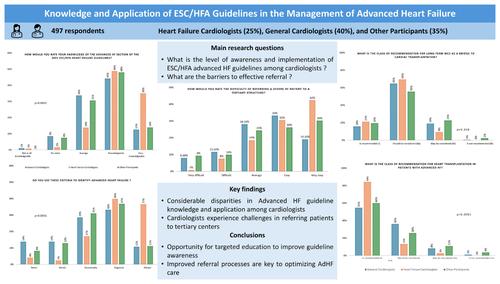当前位置:
X-MOL 学术
›
Eur. J. Heart Fail.
›
论文详情
Our official English website, www.x-mol.net, welcomes your
feedback! (Note: you will need to create a separate account there.)
Knowledge and application of ESC/HFA guidelines in the management of advanced heart failure
European Journal of Heart Failure ( IF 16.9 ) Pub Date : 2024-11-20 , DOI: 10.1002/ejhf.3530 Guillaume Baudry, Nicolas Girerd, Maja Cikes, Maria Generosa Crespo‐Leiro, Kevin Damman, Clément Delmas, Stamatis Adamopoulos, Sanem Nalbantgil, Hoong Sern Lim, Frank Ruschitzka, Marco Metra, Finn Gustafsson
European Journal of Heart Failure ( IF 16.9 ) Pub Date : 2024-11-20 , DOI: 10.1002/ejhf.3530 Guillaume Baudry, Nicolas Girerd, Maja Cikes, Maria Generosa Crespo‐Leiro, Kevin Damman, Clément Delmas, Stamatis Adamopoulos, Sanem Nalbantgil, Hoong Sern Lim, Frank Ruschitzka, Marco Metra, Finn Gustafsson

|
AimsManagement of advanced heart failure (HF) remains challenging despite specific sections in the 2021 European Society of Cardiology/Heart Failure Association (ESC/HFA) guidelines, with delays in referrals exacerbating the issue. This study aimed to evaluate the awareness and implementation of these guidelines among cardiologists and identify barriers to effective referral.Methods and resultsFrom June to October 2023, an online survey was disseminated through the ESC mailing list, targeting cardiologists across Europe. The survey investigated four areas: guideline awareness, healthcare network organization, clinical case management, and perceptions of mechanical circulatory support (MCS) outcomes. Respondents were categorized into heart failure cardiologists (HFCs), general cardiologists (GCs), and other participants (OPs). Among 497 respondents, 25% were heart HFCs, 40% were GCs, and 35% were OPs. A total of 84% of HFCs reported a high level of guideline knowledge, compared to 57% of GCs and 62% of OPs (p < 0.001). Additionally, 76% of HFCs ‘regularly or always’ used ESC/HFA criteria to identify advanced HF, compared to 44% of GCs and 48% of OPs (p < 0.001). Correct responses regarding the recommendation class for heart transplantation were 84%, 55%, and 60% (p < 0.0001), and for MCS as a bridge to transplantation, 69%, 65%, and 55% (p = 0.018) among HFCs, GCs, and OPs, respectively. Referring patients with severe HF to a tertiary centre team was found to be ‘very difficult’ or ‘difficult’ by 8.4% of HFCs, 19.6% of GCs, and 18.2% of OPs (p = 0.0005).ConclusionThe study highlights significant disparities in knowledge and application of advanced HF guidelines among cardiologists, revealing an opportunity for educational initiatives. The difficulty in referring patients to tertiary centres underscores the need to improve the referral pathway for advanced HF patients.
中文翻译:

ESC/HFA 指南在晚期心力衰竭管理中的知识和应用
目的尽管 2021 年欧洲心脏病学会/心力衰竭协会 (ESC/HFA) 指南中有特定章节,但晚期心力衰竭 (HF) 的管理仍然具有挑战性,转诊延迟加剧了该问题。本研究旨在评估心脏病专家对这些指南的认识和实施情况,并确定有效转诊的障碍。方法和结果从 2023 年 6 月到 2023 年 10 月,通过 ESC 邮件列表传播了一项在线调查,针对欧洲的心脏病专家。该调查调查了四个领域:指南意识、医疗保健网络组织、临床病例管理和对机械循环支持 (MCS) 结果的看法。受访者分为心力衰竭心脏病专家 (HFC)、普通心脏病专家 (GC) 和其他参与者 (OP)。在 497 名受访者中,25% 是心脏 HFC,40% 是 GCs,35% 是 OPs。共有 84% 的 HFC 报告了高水平的指南知识,而 GC 和 OP 分别为 57% 和 62% (p < 0.001)。此外,76% 的 HFC“经常或总是”使用 ESC/HFA 标准来识别晚期 HF,而 GC 为 44%,OP 为 48% (p < 0.001)。关于心脏移植推荐类别的正确回答为 84% 、 55% 和 60% (p < 0.0001),对于 MCS 作为移植的桥梁,HFC 、 GC 和 OP 的正确回答分别为 69% 、 65% 和 55% (p = 0.018)。8.4% 的 HFC、19.6% 的 GC 和 18.2% 的 OP 发现将重度 HF 患者转诊至三级中心团队“非常困难”或“困难”(p = 0.0005)。结论该研究强调了心脏病专家在高级 HF 指南的知识和应用方面存在显着差异,揭示了教育举措的机会。 将患者转诊至三级中心的困难凸显了改善晚期 HF 患者转诊途径的必要性。
更新日期:2024-11-20
中文翻译:

ESC/HFA 指南在晚期心力衰竭管理中的知识和应用
目的尽管 2021 年欧洲心脏病学会/心力衰竭协会 (ESC/HFA) 指南中有特定章节,但晚期心力衰竭 (HF) 的管理仍然具有挑战性,转诊延迟加剧了该问题。本研究旨在评估心脏病专家对这些指南的认识和实施情况,并确定有效转诊的障碍。方法和结果从 2023 年 6 月到 2023 年 10 月,通过 ESC 邮件列表传播了一项在线调查,针对欧洲的心脏病专家。该调查调查了四个领域:指南意识、医疗保健网络组织、临床病例管理和对机械循环支持 (MCS) 结果的看法。受访者分为心力衰竭心脏病专家 (HFC)、普通心脏病专家 (GC) 和其他参与者 (OP)。在 497 名受访者中,25% 是心脏 HFC,40% 是 GCs,35% 是 OPs。共有 84% 的 HFC 报告了高水平的指南知识,而 GC 和 OP 分别为 57% 和 62% (p < 0.001)。此外,76% 的 HFC“经常或总是”使用 ESC/HFA 标准来识别晚期 HF,而 GC 为 44%,OP 为 48% (p < 0.001)。关于心脏移植推荐类别的正确回答为 84% 、 55% 和 60% (p < 0.0001),对于 MCS 作为移植的桥梁,HFC 、 GC 和 OP 的正确回答分别为 69% 、 65% 和 55% (p = 0.018)。8.4% 的 HFC、19.6% 的 GC 和 18.2% 的 OP 发现将重度 HF 患者转诊至三级中心团队“非常困难”或“困难”(p = 0.0005)。结论该研究强调了心脏病专家在高级 HF 指南的知识和应用方面存在显着差异,揭示了教育举措的机会。 将患者转诊至三级中心的困难凸显了改善晚期 HF 患者转诊途径的必要性。































 京公网安备 11010802027423号
京公网安备 11010802027423号